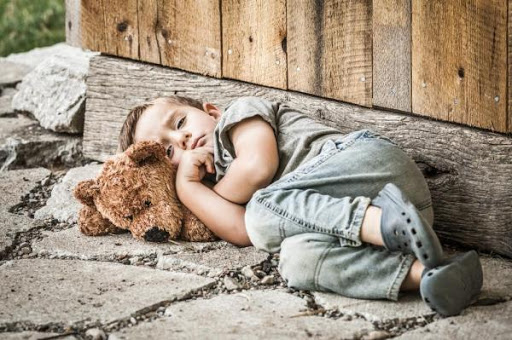When Michael Harrington's classic book, The Other America, called attention to America's general poverty rate of about 25% in 1962,
1962年,邁克爾·哈林頓的經(jīng)典著作《另一個美國》喚起了人們對美國總體貧困率高達25%這一事實的關(guān)注后,
Washington developed social programs that brought the rate down sharply.
華盛頓便推出了多個社會保障項目,將這一比例明顯降了下來。
Valuable policies, including the Earned Income Tax Credit and the Child Tax Credit, have been enacted since then,
從那以后,政府已經(jīng)頒布了多道寶貴政策,例如所得稅抵免政策(EITC),兒童稅收抵免(CTC)政策,
but they are not enough: 1 in 3 children does not receive the full benefits of these programs
然而,這些努力依然不夠:有1/3的兒童并未充分享受到這些政策帶來的紅利,
because their parents do not earn enough to be eligible for them.
因為他們父母的收入并未達到獲得那些紅利的標(biāo)準(zhǔn)。
Poor children have many needs, but research shows that money may matter most.
貧困兒童有很多需求,但研究表明,錢或許是他們最大的需求。
For example, a 2013 review of dozens of studies by London School of Economics researchers found
例如,倫敦政治經(jīng)濟學(xué)院的研究人員2013年綜觀了數(shù)十項研究發(fā)現(xiàn),
that "Poorer children have worse cognitive, social-behavioural and health outcomes in part because they are poorer,
“貧困兒童的認(rèn)知、社會-行為及健康狀態(tài)都更糟糕,一定程度上是因為他們的經(jīng)濟狀況更為落后,
and not just because poverty is correlated with other household and parental characteristics."
不僅僅是因為貧困與其他家庭因素、父母因素存在關(guān)聯(lián)。”
A family with two children receiving $300 to $400 a month per child could improve their standard of living immediately.
兩個孩子的家庭若每個孩子每月都能領(lǐng)取300~400美元的補貼,他們的生活立即就能有所改觀。
Money can buy food, heat, coats, eyeglasses and regular doctors' visits, including transportation, and help pay for childcare.
有了(補貼的)錢就能買到食物、暖氣、外套、眼鏡,就能定期看病,包括支付交通費,幫助支付撫養(yǎng)費用。
It can also help reduce family stress and help parents provide a psychologically nourishing environment in which learning and social development can germinate.
錢還能幫助緩解家庭壓力,幫助家長為孩子們提供一個心理健康成長的環(huán)境,為他們的學(xué)習(xí)和社交能力的培養(yǎng)提供營養(yǎng)。
Studies demonstrate improved cognitive and educational performance when families are simply given more money.
研究發(fā)現(xiàn),家庭只要有更多的錢,孩子在認(rèn)知能力和學(xué)習(xí)上的表現(xiàn)就會有所提升。
An illustrative finding is what happened when a Cherokee tribe passed on thousands of dollars in casino profits to its children starting in the late '90s.
一個頗能說明問題的發(fā)現(xiàn)就是,從90年代末開始,一個切諾基部落持續(xù)將數(shù)千美元的賭場利潤用到投資孩子的成長帶來的效果。
Follow-up analyses showed that these children dropped out of school far less,
后續(xù)分析顯示,相比沒有錢的類似人群,這些孩子輟學(xué)的幾率要低得多,
were incarcerated in lower numbers and had higher wages over time than similar groups with no access to cash.
進入監(jiān)獄的也更少,且隨著時間的推移,他們的收入也更高。

The historian Michael Katz correctly notes,
正如歷史學(xué)家邁克爾·卡茨指出的那樣,
"One of the odd aspects of the history of writing about poverty is the avoidance of the simple view that people are poor because they lack money,"
“綜觀描寫貧困的作品,它們都有一個很奇怪的問題,那就是它們都避免討論一個很簡單的看法:人們之所以窮,就是因為他們沒錢,”
yet both the left and the right denigrate direct cash aid as a waste and an inducement to laziness and abuse.
左右兩翼的人士卻都抹黑直接的現(xiàn)金援助是一種浪費,認(rèn)為它們反而會滋生窮人的懶惰和惡習(xí)。
It is good that Democratic presidential candidate Andrew Yang has stressed the benefits of a universal basic income,
好在民主黨總統(tǒng)候選人楊安澤已經(jīng)開始強調(diào)設(shè)置全民基本收入的好處,
citing studies that show such cash allowances do not induce the shirking of work,
他為此援引的多項研究都表明,這樣的現(xiàn)金補貼并不會帶來逃避工作的現(xiàn)象,
but his plan could cost $2.8 trillion a year and the poor would have to return welfare assistance like food stamps to receive the outlay.
只是,他提出的計劃一年就要耗資2.8萬億美元,而窮人要想享受這一補貼,就不得不以退還食品券等福利援助為條件。
For far less money—about $100 billion— the number of children living in official poverty could be cut in half.
但只要拿出這筆錢的一個零頭——大約1000億美元——就能拯救一半生活在官方貧困線以下的兒童人數(shù)。
Such a policy would be a humane, practical, efficient victory for a nation too willing to neglect its poor.
對一個求之不得想要無視其窮人階級的國家而言,這樣的政策已經(jīng)是十分人道,可行又高效的勝利了。
譯文由可可原創(chuàng),僅供學(xué)習(xí)交流使用,未經(jīng)許可請勿轉(zhuǎn)載。












